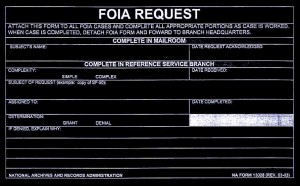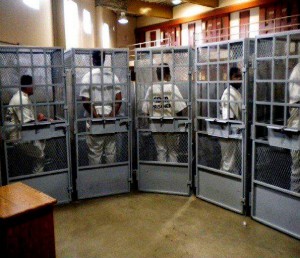Podcast: Play in new window | Download
Updates:
- Michael Ratner: Sunni Muslims Have Taken Mosul, Second Biggest City In Iraq
- Judge Rules That California Teacher Tenure Laws Deprive Students Of Education
- Imagine: Living In A Socialist U.S.A. Book Event- NYC Public Library June 23 6:30PM
——–
The Electronic Privacy Information Center, The NSA, FOIA Requests, And Wikileaks
The Electronic Privacy Information Center or EPIC is among a handful of organizations trying to reveal the massive surveillance of the National Security Agency. We talk about a few of EPIC’s most important cases being litigated that you may not have heard about. EPIC had filed a massive FOIA request on behalf of Wikileaks to the Criminal and National Security Divisions of the Department of Justice, and to the FBI asking for multiple records including any individuals targeted for surveillance for support for or interest in WikiLeaks. We talk about that and their lawsuit involving the NSA not being subject to FOIA requests plus a victory involving the Department of Homeland Security’s ability to deactivate wireless communications networks in a crisis.
- The FOIA requests we made five years ago for the NSA Cybersecurity Authority was a request that we sent to the NSA, litigated in the district court and on appeal in the DC Circuit last Friday just a few days before the government’s brief was due, they contacted us and said they were disclosing to us the document we had been trying to obtain.
- This is National Security Presidential Directive 54 and that outlines all the cyber security authorities for the federal agencies.
- The scope of our work is very much driven by our mission. Our mission is to focus public attention on emerging privacy and civil liberties issues.
- The FBI wants to put together the next generation identification system which will be the largest biometric database in the world and we think the implications for privacy and freedom are just staggering.
- Google also retains everybody’s search histories.
- We also do a lot of open government litigation so people can learn about these issues and we do a lot of amicus briefs.
- In our organization there’s actually deep division about Wikileaks. Some people think Julian Assange is a hero and some people would like to see him arrested.
- What was interesting to us about the Wikileaks case – we did see a persons of expressions of support for Wikileaks as core First Amendment speech.
- We became very interested through the FOIA with how the federal government was apparently intervening with private companies, bank payment companies, cloud service providers and others to try to chill the ability of Wikileaks supporters to contribute to the organization, to get access to hosted documents.
- We simply believe it was wrong for the government to simply discourage people their support or even their opposition.
- With the FOIA, one of the things you’re trying to do is get information out to the public and hope that others find that its useful.
- We think its a fundamental obligation for any internet company that collects personal data to stand up to the government when there are court orders.
- Our other case in the DC Circuit – this concerns a technique used in San Francisco basically to shut down cell phone service among people who had gathered at a protest to object to the police conduct that I think resulted in the death of a person on the BART system.
- Pursuant to a secret policy known as Standard Operating Protocol 303, somehow the Department of Homeland Security got the local telephone service to shut down cell phone service in the region and people couldn’t communicate and the protest was effectively stopped.
- Our FOIA request was for the policy which we think has to be made public. You can’t have a secret procedure that so deeply implicates First Amendment freedoms.
- We went laser focused after that one document and the DHS was throwing up all these law enforcement exemptions, 7E and 7F involving techniques and methods saying this was vitally important to protect public safety which was an interesting argument too.
- Submit FOIA requests – if a government agency has a reason to withhold a record, the burden is on the agency to justify the reason for the withholding.
Guest – Attorney Marc Rotenburg, Executive Director of the Electronic Privacy Information Center (EPIC) in Washington, DC. He teaches information privacy law at Georgetown University Law Center and has testified before Congress on many issues, including access to information, encryption policy, consumer protection, computer security, and communications privacy. He testified before the 9-11 Commission on “Security and Liberty: Protecting Privacy, Preventing Terrorism.” He has served on several national and international advisory panels, including the expert panels on Cryptography Policy and Computer Security for the OECD, the Legal Experts on Cyberspace Law for UNESCO, and the Countering Spam program of the ITU.
—–
Hundreds of California Prisoners in Isolation to Join Class Action Lawsuit
Last year we spoke with attorney Jules Lobel about his lawsuit challenging long term solitary confinement in California prisons. Recently, a federal judge in Oakland California ruled to agree to consider as part of that lawsuit if long term isolation violates a prisoners’ Eighth Amendment rights. Prisoners in prolonged solitary confinement at Pelican Bay prison can spend 22 to 24 hours a day in a cramped, concrete windowless cell. Mostly, they’re there for their alleged connection to gangs and their refusal to become government informants.
- Pelican Bay is a prison that holds over 1000 prisoners. It’s located on one of the most isolated sections of the United States coast line border between California and Oregon.
- It was deliberately placed there because most of the prisoners are from Los Angeles.
- It’s very hard for their friends and family to visit them.
- They spend virtually their whole day in an 80 square foot cell with no window.
- They virtually get no visitors, they can’t make any phone calls. They’re fairly isolated from the outside world and from each other.
- Many of my clients have been in this kind of cell for over a decade.
- California estimates there are about 225 that have been there for over a decade.
- A number of my clients have been there for over 2 decades.
- California puts them there not because they’ve done anything violent in prison, or in some cases they haven’t done anything violent outside of prison . . mainly drug offenses . . . but because they have an association could be very loose, could be because of having a tattoo or a piece of art work which suggests you’re in some way associated with a gang.
- The only way out was to become an informant and then you and your family were in grave danger of being killed or assaulted by the gang.
- Recently in California after 3 hunger strikes, pressure from the lawsuit, pressure from the legislature, has instituted some reforms so there are for some of the people a way at least to another solitaire prison or the general population.
- They come up for review once every six years in the system that’s currently in place.
- The Ninth Circuit court has said anything over 1 year is too long for reviews.
- There have been hundreds of law suits challenging various aspects of this situation in Pelican Bay, from the due process to they’re not given any chance to prove that they can get to its cruel and unusual punishment to keep people in there for 10-15-20 years.
- Now for the first time the judge has said I’m going to take this as a class action which means I’m going to look at the general policies that California is instituting and if we were to win, try to change the system.
- Our argument is that these conditions are cruel and unusual to keep people in for this long of time.
- We said we need to meet with all of our clients all together. We can’t meet with one individual then another individual.
- The state said that’s impossible, these people are so dangerous you can’t possibly meet with them all together, but the judge ordered it.
- We got a meeting, if you can imagine the cell that Hannibal was in? They put 10 of these cages side by side, and they put us in a big conference room. They mandated that we had to wear flak jackets. We were seated at a table with Marine outfits.
- What it really is is to force these guys to become informants, to make it as cruel as possible and the only way out is to become an informant.
- It essentially alters your personality. You die a social death.
- Our case, if we were to win would be the beginning of the death knell of solitary confinement in this country.
- 80 thousand prisoners as we speak are in some form of solitary in this country.
- One of the things about this case is that it requires substantial funding and we’re always looking for people to help with funding the case.
Guest – Attorney Jules Lobel, has litigated important issues regarding the application of international law in the U.S. courts. In the late 1980’s, he advised the Nicaraguan government on the development of its first democratic constitution, and has also advised the Burundi government on constitutional law issues. Professor Lobel is editor of a text on civil rights litigation and of a collection of essays on the U.S. Constitution, A Less Than Perfect Union (Monthly Review Press, 1988). He is author of numerous articles on international law, foreign affairs, and the U.S. Constitution in publications including Yale Law Journal, Harvard International Law Journal, Cornell Law Review, and Virginia Law Review. He is a member of the American Society of International Law.
——————————————————————-



